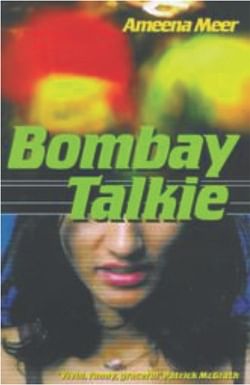| Home - Back Issues - The Team - Contact Us |
 |
| Volume 11 |Issue 28| July 13, 2012 | |
|
|
writing the Wrong Conundrum of “Brown” Sharbari Ahmed Shu-ching Chen writes in her thorough, if somewhat dense and pedantic essay, “To Report A Crime: The Woman Warrior as Live/Life Testimony: One of the important features of ethnic literature lies in the writers' specific responsibility toward their ethnic communities…Unlike writers of the dominant race who are able to bypass their racial status and claim their writing a representation of universal human condition, ethnic writers find their ethnicity an indelible factor of their artistic activity.
As my good friend, Ameena Meer, the Indian-American author of the acclaimed novel, Bombay Talkie says: “If I wrote about my life as an African-American woman growing up in Harlem, I would be destroyed in the press. A white man can write about being an African woman or an Indian one and it's ok”. Chen goes on to say: “More than writers of other social orientation, ethnic writers are compelled, and often feel obligated to be the spokespersons of their communities. The issue seems to be whether there is only one way--one that is operating along the binary of loyalty and betrayal--to express one's ethnicity.” That's a lot of pressure! But is it even true? Could it be that we are too preoccupied with ethnicity? Shouldn't it follow that good writing is good writing and if a young, female Bengali writer creates a compelling, believable character, who is, say, an aging, cranky white male, and nothing like her, should she not be encouraged to keep telling this particular story? What if the Bengali writer is so powerfully moved to write this? Indeed, many writers talk about the compulsion to tell a specific story that seemingly comes from out of the blue. A voice whispering into our ears, “tell my story, please. Never mind that you are not a 76-year-old herring fisherman from Norway, like me. You are who I choose to tell this story, my story.” Isn't that what art is all about? Transcending boundaries, bridging chasms? Giving voice and perspective from the other side of the shore? The other side of the coin, as Chen mentioned, the “binary of loyalty and betrayal” is the peculiar responsibility we have as ethnic writers. If we shirk this responsibility and pander more than not, are the social ramifications serious? Ameena thinks we have a duty to be as true as possible. I agree, because we cannot rely on others to tell our histories for us and are perhaps contributing to our own second class status by pandering. I will indulge in bombast and offer that in particular cases when an ethnic writer's work is about bearing witness to a painful history, not being authentic and accurate is potentially dishonouring those who came before us, paid the higher price for freedom and paved the way for their descendants. The fact is, sometimes, there will be the stray, inauthentic ethnic writer, who feels compelled to pander to the “dominant race”, because this dominating force is the one, more often than not, running the publishing houses and issuing the advance checks. This ethnic writing will be a marketing dream, and appeal to that Western sensibility that insists on viewing us as exotic and “Other.” This writer will go out of their way to create a world that is more palatable, with no nasty ethnic surprises from the native elements in the story, or they will simply reinforce the negative stereotypes. When this happens, I always imagine some white person reading a passage, and going, I knew it! I knew all Indians urinated in the street or some such nonsense. Sometimes these writers' facts will be faulty and the history a bit confused. They might know this, but perhaps no white publisher will question it for fear of causing racial offence or admitting to their own ignorance. Are we, as ethnic writers, held to a more stringent standard, however? Are we harder on ourselves? Should we be harder still?
“Does he turn us into minstrels,” I asked, (I have not read Naipaul, I could never get into it). “Major Uncle Tom,” she replied, referring to the ingratiating nature of the work and the scrim of self loathing that is, at times, part and parcel of ethnic writing gone awry. “When there is no affection, there is no intimacy,” she explains eloquently. “It limits the reader's experience.” This limitation might not be a problem for those of from the community, because we are in the know, except that then the story doesn't relate on a human level for us. But it is doubly problematic if members of another ethnic community read it, and celebrate this limited representation of a culture as authentic and good. I won't go on about Naipaul. This is a man who stated that women cannot write serious or noteworthy literature. He even dismisses Jane Austen. As far as I am concerned, he can wallow in his post-colonial shock syndrome ad infinitum or at least until he meets his maker for this reason alone. I often joke that if I read yet another over wrought, South Asian story that involves the joys of cooking with turmeric, arranged marriages or some type of wacky pseudo spiritual South Asian mysticism, I would throttle someone, or myself. But even I experimented with these types of subjects when I first started consciously crafting fiction because that is what Western publishers seemed to want. I was still trying to find a voice and this was not my authentic one and, thus, I failed miserably. In any artistic endeavour, accuracy, and truth telling should be treated with holy respect. I recently asked a colleague and friend to look over a script I had written and she came back with a million notes on what was inaccurate, and how many things—factual, almost quotidian things, were simply not logical. I was very grateful for this, as she knew more about the setting than I did. It was a million small things that if left uncorrected, would actually undermine the entire story, though many people would not know. I dislike labels and don't want to be identified as an “ethnic” writer, but that is what I am, I guess. A brown woman, Bengali, American, who, besides dealing with the inevitable frustrations and compulsions to write, must contend with having to stay within the confines of a history and identity that I only partially relate to. |
Copyright
(R) thedailystar.net 2012 |
 Translation: we brown folks writing in English feel an urgent need to “represent” and be authentic about our identities and histories, thus limiting ourselves to the confines of these identities and histories. White folks can get away with creating a broader array of characters and story lines, and not be tarred and feathered for it; or held accountable for deigning to tell another group's story.
Translation: we brown folks writing in English feel an urgent need to “represent” and be authentic about our identities and histories, thus limiting ourselves to the confines of these identities and histories. White folks can get away with creating a broader array of characters and story lines, and not be tarred and feathered for it; or held accountable for deigning to tell another group's story.  When I asked Ameena who she felt was the most misrepresentative, brown writer, she unhesitatingly said, “V.S. Naipaul. More than anyone.” When she read him in college, she liked the writing itself and found it “compelling” but said, “all of a sudden you realise that there is no affection in the writing no love or kindness [towards his own group]”.
When I asked Ameena who she felt was the most misrepresentative, brown writer, she unhesitatingly said, “V.S. Naipaul. More than anyone.” When she read him in college, she liked the writing itself and found it “compelling” but said, “all of a sudden you realise that there is no affection in the writing no love or kindness [towards his own group]”.